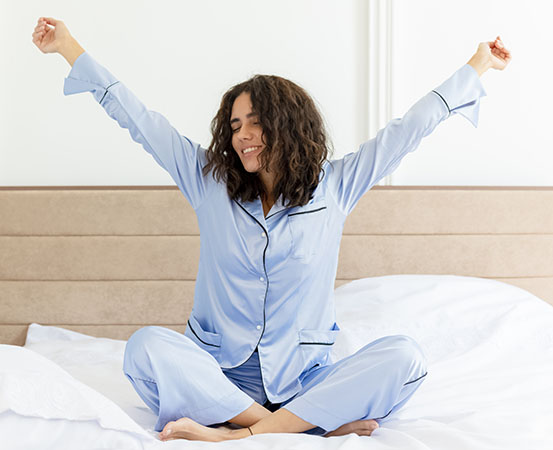
Every person who feels tired during the day due to lack of sleep craves a restful night’s slumber. But falling asleep or staying asleep could prove to be a challenging task for those with insomnia. Sleep deprivation could lead to chronic conditions such as type 2 diabetes, heart disease, obesity and depression, as well as motor accidents and mistakes at work.
“A sleep-deprived person feels tired, has less energy, may have headaches or heaviness of head, forgetfulness, mood swings, anger issues, irritability, body aches and pain. If we look at the long-term adverse effects, people who sleep less than six hours, have a higher risk of developing diabetes mellitus, hypertension, heart attacks, strokes and cancers,” says Dr Sudhir Kumar, senior consultant-neurologist, Apollo Hospitals, Hyderabad.
Dr Pavan Yadav, lead consultant, interventional pulmonology and lung transplantation, Aster RV Hospital, Bengaluru, suggests tips to overcome insomnia.
Sleep hygiene
Adopting good sleep habits, such as maintaining a consistent sleep schedule and creating a relaxing bedtime routine, can help improve sleep quality. One should avoid caffeine or alcohol-containing beverages after six in the evening.
Cognitive behavioural therapy for insomnia (CBT-I)
This therapy addresses the thought patterns and behaviours that contribute to sleep problems and offers effective coping strategies.
CBT can take place in either individual or group therapy settings. This is a collaborative method, wherein the therapist and the individual work in partnership to establish objectives, craft methods to handle emotions and thoughts and assess advancement.

Avoid sleep medications
Short-term use of sleep aids or sedatives may be prescribed in severe cases, but they should be used cautiously and under medical supervision.
Experts say that over-the-counter sleeping pills should be avoided because they can cause problems in the long run. Overuse of these pills could cause the body to become more accustomed to these medications, leading to the need for increased dosages to achieve the desired effects. People may become more ‘tolerant’ of these drugs, ultimately reaching a point where discontinuing them results in a lack of sleep. This marks the beginning of an addictive pattern.
Stress management techniques
Engaging in relaxation practices like yoga, meditation or deep breathing can reduce stress and promote better sleep.
Yoga nidra or ‘yogic sleep’, is a guided relaxation technique that brings together guided meditation and the shavasana pose (corpse pose). The practitioner pays attention to the different parts of the body, in an attempt to relax them physically and mentally.

Limit daytime naps
Naps should be limited to 15 to 30 minutes. Sleeping more than 30 minutes during the day can disturb one’s night sleep.
Harvard Health mentions in an article that in case a person is planning to take a nap during the day, he/she should time it right, keep it short and find a quiet spot without distractions. The person should also examine the motivation behind wanting to take a nap. If one is getting enough sleep at night and is still sleepy during the day, he/she should consult a doctor.
Create a sleep-friendly environment
Ensure your bedroom is quiet, cool and dark. A dark and quiet environment signals the brain to sleep and promotes the production of melatonin, the sleep hormone. Melatonin levels rise a couple of hours before bedtime and this is the right time to get oneself mentally ready for sleep, say experts.
Investing in comfortable mattresses and pillows can also improve the quality of sleep.
Limit screen time
Melatonin is produced by the pineal gland in the brain in response to darkness. Using screens (phones, laptops, TV) can disrupt this process because of the blue light they emit. Experts suggest putting away the screens at least an hour before bedtime and also suggest turning off harsh lights, especially bright overhead lights.
Regular exercise
Engage in moderate physical activity during the day. Taking light walks can help relax the mind. But experts suggest avoiding intense workouts close to bedtime as they can increase cortisol levels in the body. Cortisol is the primary stress hormone, which causes an increase in one’s heart rate and blood pressure. This hormone also increases sleep latency (the time taken to fall asleep).

Watch your diet
Avoid heavy meals before bedtime. Eating late is metabolically less effective due to decreased physical activity. This could lead to the direct accumulation of fat, contributing to obesity. Moreover, binge eating could also trigger excess acid production in the stomach, elevating the risk of developing gastroesophageal reflux disease (GERD).
Doctors also suggest staying away from caffeine and alcohol before bedtime and instead opting for a light, sleep-promoting snack or drink like camomile tea or a handful of almonds.
Establish a bedtime routine
Engage in relaxing activities before bed, such as reading or listening to soothing music.
A warm bath before bedtime can also help one get good sleep because it lowers the body temperature. The core body temperature varies throughout the day and tends to drop towards bedtime. A drop in body temperature signals the brain to produce the sleep-inducing hormone, melatonin.


















2 Responses
Good information, but how we control our emotions and anixty it is big question
Quite correct and most common suggestions !